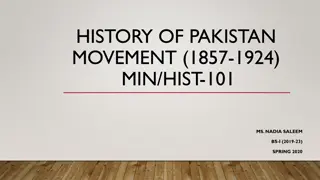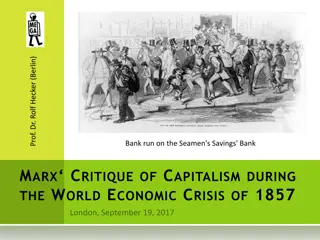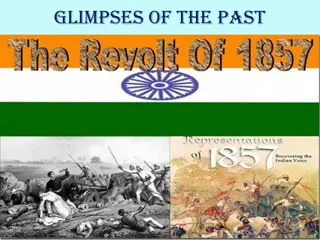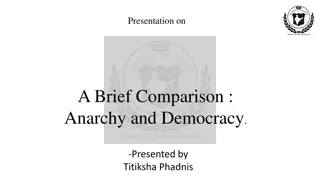Life and Contributions of Auguste Comte: A Pioneer of Sociology and Positivism
Auguste Comte, born in 1798, is renowned as the father of sociology who coined the term. He made significant contributions to social theory, particularly with his "Laws of Three Stages" and the positivist philosophy. Despite personal struggles, he published influential works and left a lasting impac
0 views • 13 slides
War of Independence 1857: Causes, Impact, and Failure
The War of Independence in 1857 was a pivotal moment in the history of the Indian subcontinent, fought against British domination. Despite efforts by Indians, including issues of conflict and lack of leadership, the war ultimately failed due to various political, social, religious, military, and eco
0 views • 22 slides
Understanding Impression Compound in Dentistry
Impression compound is a key material in dentistry used for making negative reproductions of teeth and surrounding structures. It plays a crucial role in the fabrication of dentures, crowns, bridges, and orthodontic appliances. The accuracy of the impression directly impacts the fit and functionalit
3 views • 17 slides
Biography of Sir Syed Ahmed Khan - Pioneer of Muslim Education in India
Sir Syed Ahmed Khan, born in 1817, was a prominent figure in Indian history who played a key role in advocating for modern education among Muslims. Facing challenges post the war of 1857, he established schools and a scientific society to promote science and English education. His efforts culminated
1 views • 18 slides
Causes and Effects of the 1857 War of Independence in India
Politically, the Doctrine of Lapse and mistreatment of local Indian leaders contributed to the uprising. Religious tensions arose due to British interference and social inequality. Economically, high taxes and exploitation of Indian wealth fueled the discontent. The military also played a significan
0 views • 17 slides
Impact of Industrial Revolution on Andhra under British Rule
The Industrial Revolution in England had significant repercussions on Andhra under British rule, leading to a decline in local industries, exploitation of resources, and economic setbacks. Due to England's mercantilism, Andhra suffered the loss of self-sufficiency and prosperity, with industries bei
0 views • 12 slides
Complexity and Critique in Joseph Conrad's Works
Joseph Conrad, born in Poland in 1857, was a British writer known for his critical portrayal of imperialism. His major works like "Heart of Darkness" and "Lord Jim" explore themes of societal collapse, individual crisis, and complexity of experience. Conrad's writing challenges the Victorian narrati
0 views • 6 slides
Catherine Harkins: The First American Lady of Charity
Catherine Harkins, a 23-year-old wife and mother, founded the Association of the Ladies of Charity in 1857 in St. Louis, Missouri. Despite facing challenges like the Panic of 1857 and the Civil War, she led the society to provide charitable services to the hungry and poor. Her journey began with a d
0 views • 13 slides
The Inspiring Life and Hymns of Jennie B. Wilson
Born in 1857, Jennie B. Wilson overcame physical challenges to become a prolific hymn writer. Despite a life spent mostly in bed or a wheelchair, she wrote over 2200 poems and hymns. Her famous hymn "Hold to God's Unchanging Hand" reflects her unwavering faith and hope in eternal things. Through her
0 views • 15 slides
Evolution of Muslim Journalism in the Sub-Continent Post 1857: Key Figures & Publications
Explore the evolution of Muslim journalism in the sub-continent after 1857, highlighting key publications like Hamdard, Comrade, and Zamindar, alongside notable journalists such as Hasrat Mohaani, Muhammad Ali Johar, and Maulana Zafar Ali Khan. Discover their contributions to political consciousness
0 views • 12 slides
Marx's Critique of Capitalism During the 1857 World Economic Crisis
In 1857, amidst a world economic crisis, Karl Marx worked tirelessly on his economic manuscript, the Grundrisse, focusing on the political economy outlines and the current crisis. He aimed to create a pamphlet to remind the German public of his presence. Marx identified France as a potential site fo
0 views • 13 slides
Overview of the First War of Independence in India (1757-1857)
The content provides glimpses of India's past, focusing on the period from 1757 to 1857, leading up to the First War of Independence. It outlines the British East India Company's expansion, social issues in Indian society, British oppression, the role of key figures like Ram Mohan Roy, and the event
0 views • 16 slides
A Brief Comparison: Anarchy and Democracy in India
India's transition from anarchy under imperialist rule to democracy post-independence is explored through key legislative acts and reforms implemented over the years. The presentation examines the Regulating Act of 1773, Indian High Courts Act of 1861, and Government of India Acts of 1858, 1919, and
0 views • 15 slides












